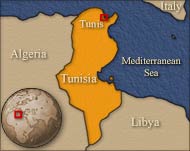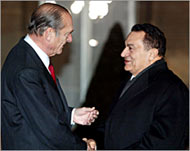Is there room for Europe?
Since the end of the cold war, Europe’s ambitions to play a more active and influential role in the Middle East have grown significantly.

This does not mean, even among the most enthusiastic supporters of the European ideal, an expectation of supplanting the dominant role played by the US.
It is recognised that Europe does not have the global military capabilities possessed by the US and, as the Iraq war cruelly demonstrated, European states remain divided about the role they should play, not least in their responses to US policy in the region.
A clearer vision
Nevertheless, there has emerged a more clearly defined European interest and stake in the Middle East which has led to the demands for a more effective and pro-active strategic response.
This is due to a number of factors. There are the historical ties which link Europe and the Middle East, not least the legacy of European colonial penetration into the region.
The Middle East is geographically close to Europe and the EU remains the largest trading partner for most Middle Eastern states, being the destination of more than 50% of exports from the region.
Wielding power
During the past decade, the European Union has also developed as a more unified and ambitious foreign policy player.
|
The Middle East now represents the clear geographical periphery of the European union |
As the EU has become a more powerful and centralised economic group, as seen in the creation of a single market and the adoption of the euro, it has sought to translate this into greater political power projection, seeking to develop a common foreign and security policy and an expeditionary defence capability.
In 2003, the European Union set out a European Security Strategy to give substance to this more expansive role.
The enlargement of the union, which has taken on 10 new members in May 2004, has further increased the European interest and stake in the Middle East. The Middle East now represents the clear geographical periphery of the union.
The Turkish question
The prospect of Turkey becoming a full candidate country, which will be decided in December 2004, would accentuate this Middle Eastern dimension to Europe’s identity.
The relative poverty of the region; the fast demographic growth; the prevalence of authoritarian regimes; the multiple unresolved conflicts; the presence and potential proliferation of weapons of mass destruction – all of these factors make the Middle East a critical strategic concern for European states.
As such, Europe seeks to play a role in the Middle East commensurate with its interests in the region and its growing power capabilities and presence in international affairs.
Muslim minorities
It is not just geographical proximity that drives European policy. There is also the fact that there are more than 10 million Muslims in European countries, many of whom have close links to, or are strongly influenced by, political developments emanating from the Middle East.
 |
|
Muslims in Europe appear to have |
European leaders are conscious of this sense of mutual vulnerability, with the former French foreign minister, Herve de Charette, noting that “when violence returns to the Middle East, sooner of later it will show up in Paris”.
It would be a mistake, though, to consider the Muslim communities in Europe as a consolidated interest group that wields the power and influence comparable to that of the Jewish community in the US.
They are far more internally divided, less politically integrated in their respective states and have generally not been successful in terms of political mobilisation to influence European foreign policy.
Europe’s policymaking
Policy towards the Middle East remains essentially the preserve of European leaders and elites.
If there is a pro-Arab bias in European policymaking, as US and Israeli critics argue, this is best understood as reflecting the views and convictions of these leaders rather than a direct response to pressure from their Muslim constituents.
It is noticeable that the more pro-Israeli orientation of Germany and the Netherlands has not been modified by the large Muslim presence in these countries.
|
Arab and Muslim communities are seen less as an asset for European policymaking |
Similarly, German political discourse, as seen in the recent shift in the position adopted by the Christian Democrats, has not been restrained from taking a negative attitude to Turkey’s accession to the EU despite the large Turkish-origin community.
In general, the Arab and Muslim communities are seen less as an asset for European policymaking and more as a troublesome internal security threat which European policy towards the Middle East seeks to contain.
Reform plans
The main European plan for reforming the Middle East has been the Euro-Mediterranean Partnership (EMP), which was adopted in Barcelona in November 1995 and which often goes under the name of the Barcelona Process.
The EMP was established at a time of considerable optimism in the Middle East, when it appeared that a resolution of the Arab-Israeli conflict was finally close to being achieved.
The EMP represented an ambitious and rather idealistic attempt to bolster and consolidate these advances in the peace process.
The focus given to the idea of a Mediterranean region was aimed to encourage a regional process of integration, leading ultimately to a free-trade zone by 2010, which would break down barriers not only between the rich European countries and the poorer south but also between the Mediterranean countries themselves.
Unusual partnership
The partnership sought to avoid becoming a club of Arab states and Israel through incorporating countries such as Malta, Cyprus and Turkey and by excluding Iraq and the Gulf Arab states.
In a similarly unconventional manner, the security problems of the region were understood through a “comprehensive” security paradigm which saw the roots of the problems of the region as due to the failure of economic development, regional economic integration, and the lack of respect for human rights and democracy.
The EMP aimed to deal with these “deeper roots” of conflict in a spirit of partnership and engendering local “ownership” of the reform process rather than through external imposition.
In practice, the results of the Barcelona Process have been generally recognised to be disappointing.
EU assistance
The funds provided by the EU for support of this process have not been ungenerous.
For the period 2000 to 2006, these include allocations of 5.45 billion euros ($6.4 billion) for the so-called MEDA programme and another 6.4 billion euros for loans provided by the European Investment Bank.
 |
|
Tunisia’s economy is one of many |
Admittedly, on a per capita basis, this is considerably less than was provided for the candidate countries from East Central Europe (ECE) but, then again, these financial incentives have not unleashed the same degree of economic dynamism as seen in ECE.
|
|
There have been some encouraging signs, with countries such as Morocco and Tunisia implementing economic reforms which make them potentially future Middle East tiger economies.
But, the general picture is of continued economic stagnation with the slight improvements in performance in the late 1990s and early 2000s due more to high oil prices and a slowing of demographic growth than flourishing economies.
Low global investment
In particular, the southern Mediterranean partners have continued to attract only 1.1% of global foreign investment inflows, a record which is only comparable to that of sub-Saharan Africa.
The expectation that the promotion of economic liberalisation would lead to political reforms has also failed to materialise.
Authoritarian regimes appear to have been emboldened rather than internally weakened by their implementation of these reforms.
These regimes have often successfully played on the internal contradictions in European policy where the maintenance of stability and security have been accorded a higher value than encouraging uncertain and destabilising political change.
For Arab civil society, this has often been perceived as a cynical compact between Europe and the Arab regimes to consolidate the political status quo.
The US initiative
Europeans do not, therefore, come with ready answers to the economic and political problems of the Middle East.
 |
|
Europe remains frustrated by |
But, the European response to the ambitious US plans for reform reflect the mix of hopeful expectation, ingrained scepticism and sense of frustration which has generally characterised European reactions to the Bush administration’s Middle East policy.
The sense of expectation lies in the hope that this plan corresponds to a US realisation that political change will not come from military imposition but a deeper, more sustained and long-term engagement in the economic and political developments in the region.
The scepticism lies in the fear that this plan is less substantive than it looks and represents more an electorally driven exercise in window-dressing.
Lack of interest
European concerns were only accentuated when it appeared that US policymakers had little knowledge of the Barcelona Process and the considerable experience that the Europeans have themselves gained over the past decade.
|
US policymakers have little knowledge of the considerable experience that the Europeans have gained [in the Middle East] |
The sense of frustration comes from the continued US failure to engage fully in a resolution of the Israeli-Palestinian conflict.
One lesson that the Europeans have learned is that the main obstacle to the Barcelona Process has been the sense of Arab desperation at this continuing failure to resolve the conflict.
EU helps Palestinians
This has forced the EU to adopt a more intensive role in the Middle East Peace Process, not least through providing a lifeline to the Palestinian Authority through substantial financial support.
The US, to a certain extent, has recognised this EU role, making the EU its most important partner in the quartet and the promotion of the road map.
But, the EU continues to be frustrated in its attempt to convince the US that peace will only come through an external imposition of a settlement rather than through fruitless attempts to get the two sides to come to an agreement.
The way forward?
But, Europeans are also conscious that they need to take on the lessons of the disappointments of their reform plans.
 |
|
EU leaders such as Chirac (L) |
There is an acceptance that the scope of the EMP remains too narrow and that there needs to be a more comprehensive engagement which incorporates Europe’s interests in Iraq, Iran and the Gulf states.
But, there is also a recognition that this needs to be balanced by much more targeted economic and political support for those Middle Eastern states that are genuinely interested in promoting economic and political reform.
In this process, Europeans need to be less equivocal in tying the financial and technical support they provide with conditions and targets for political reforms and respect for human rights.
Europe and the US
While Europeans remain to be convinced of the serious intent of the US reform plans, they also realise that there is much to be gained through the US and Europe combining their efforts and complementing their respective strengths and weaknesses.
However, if these synergies are to be realised, an essential pre-condition is that the US should treat Europe as a more equal partner, recognising Europe’s distinctive interests and concerns, than has been the case so far with the Bush administration.
Roland Dannreuther is a senior lecturer in politics at the School of Social and Political Studies at the University of Edinburgh.